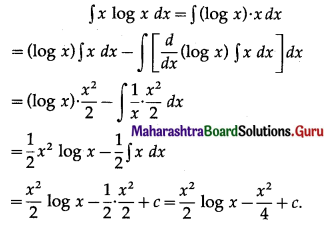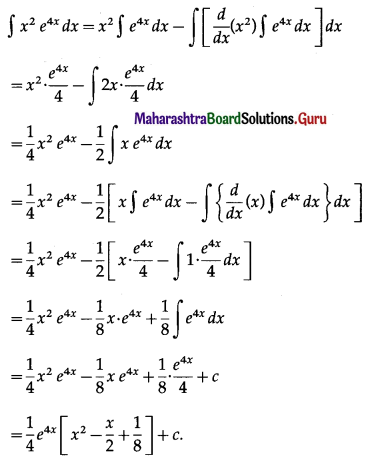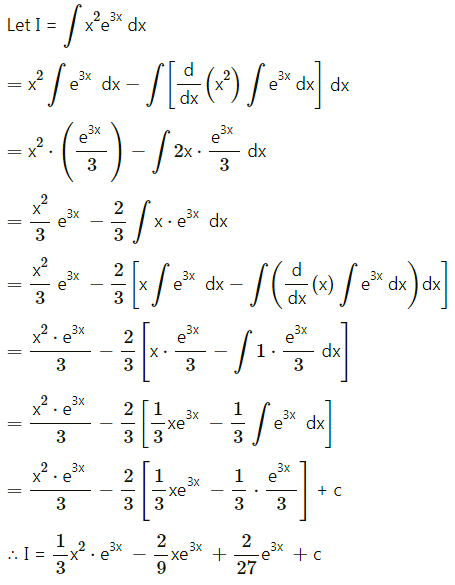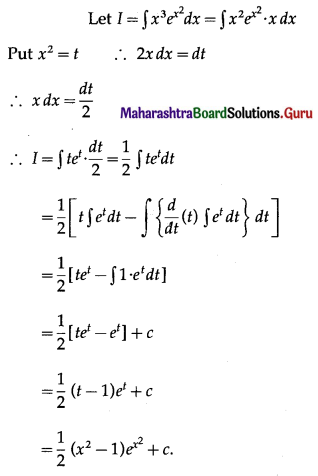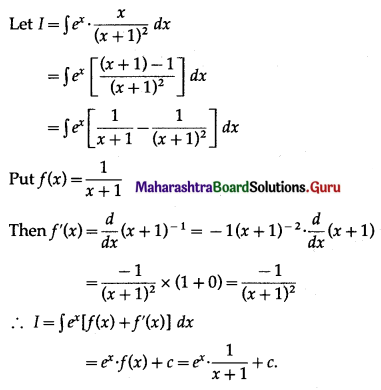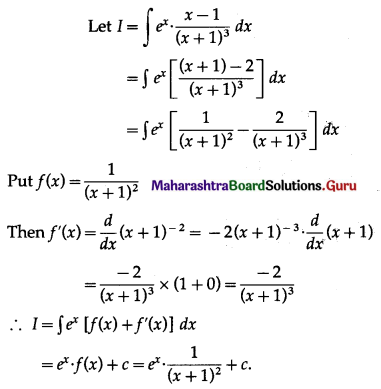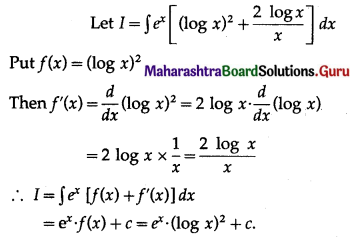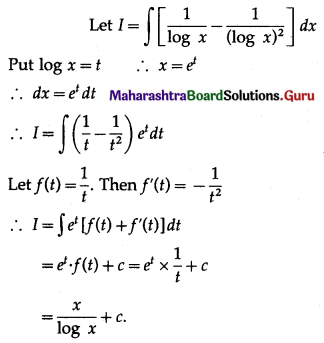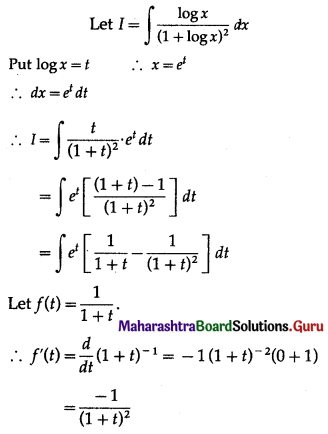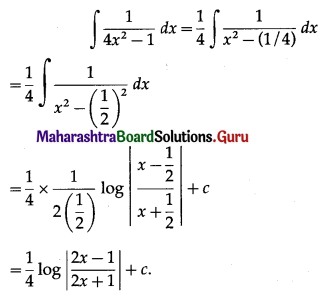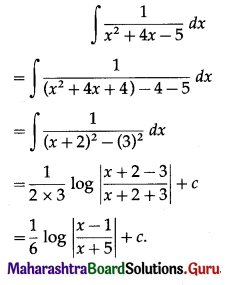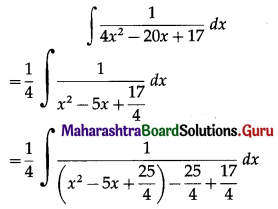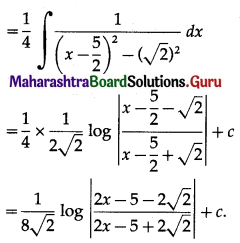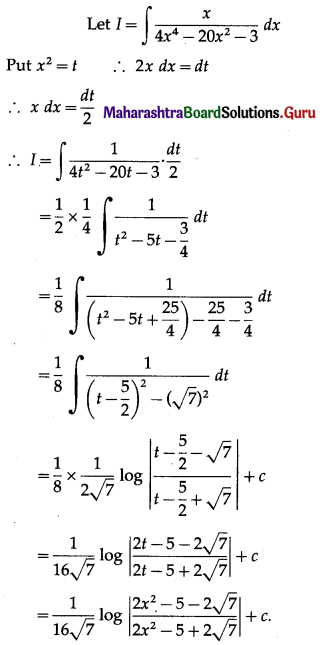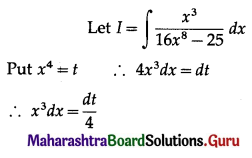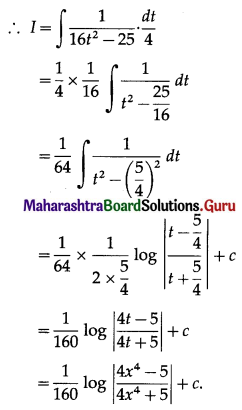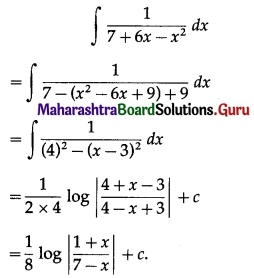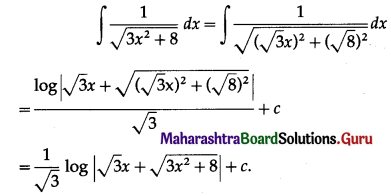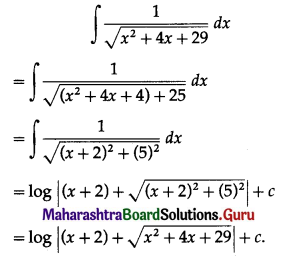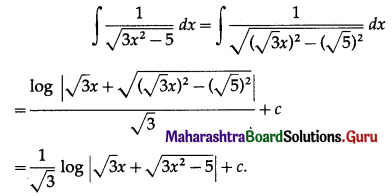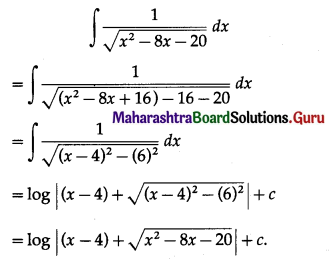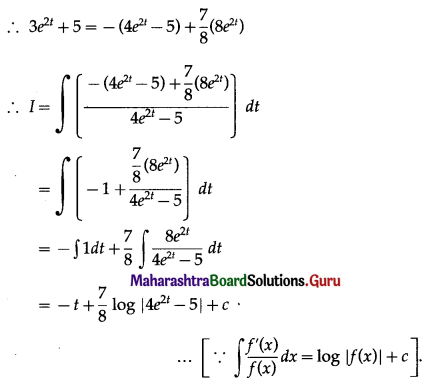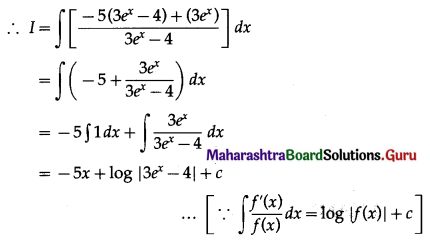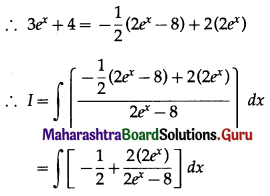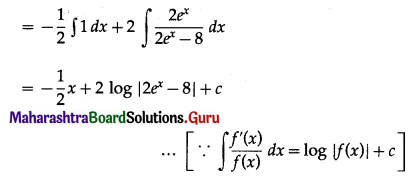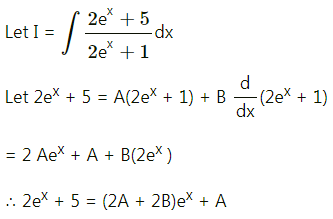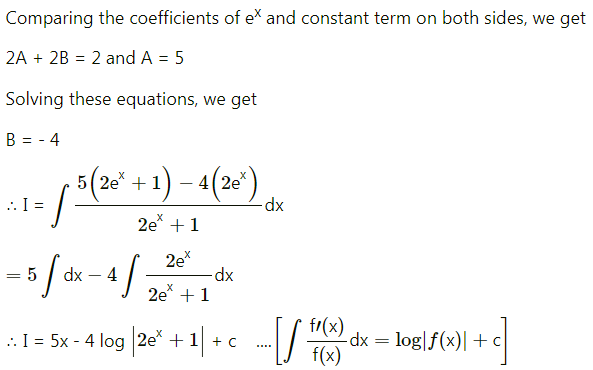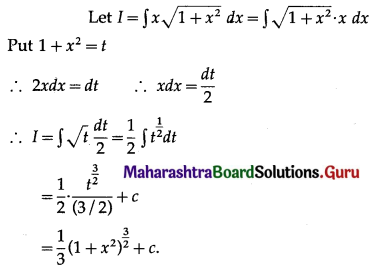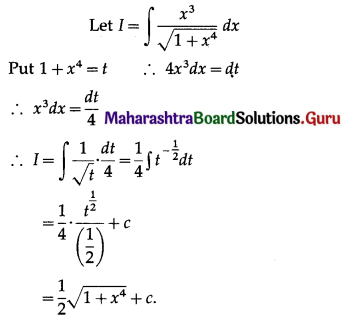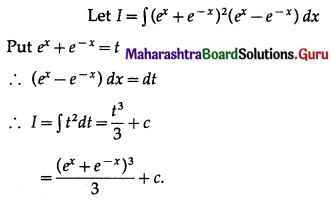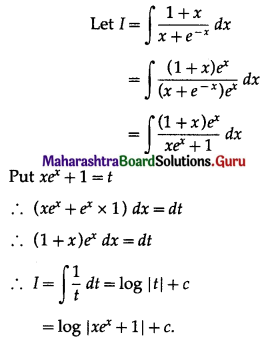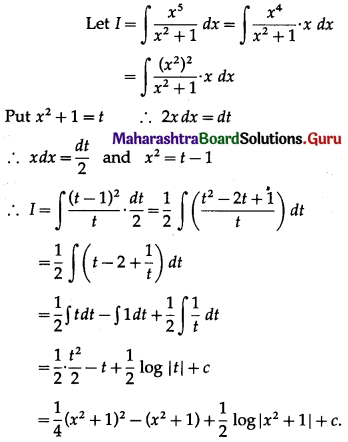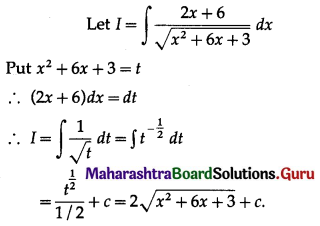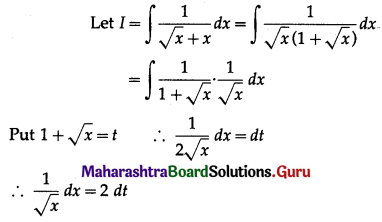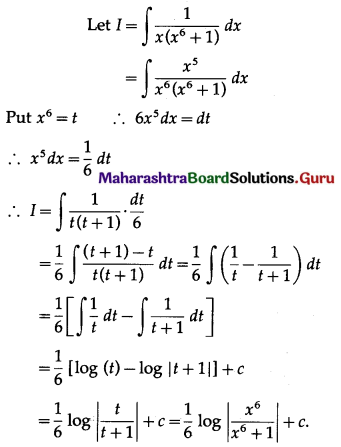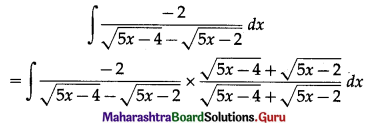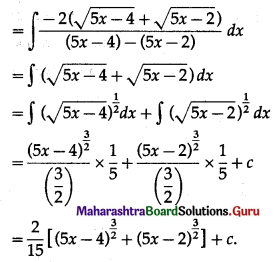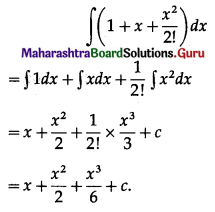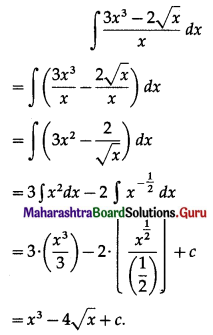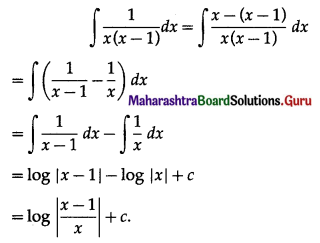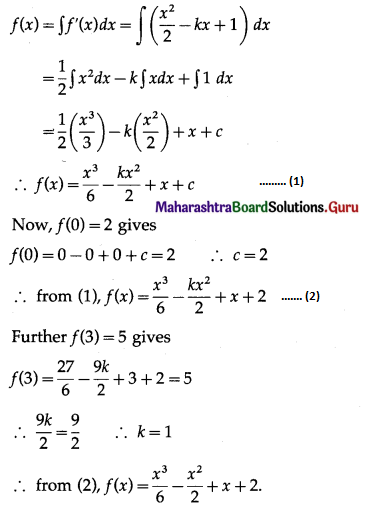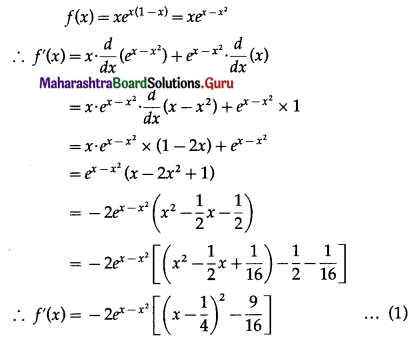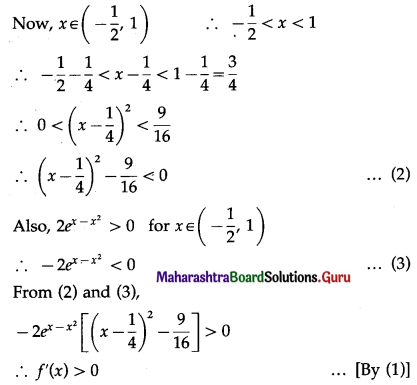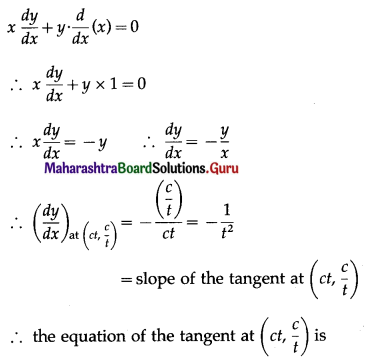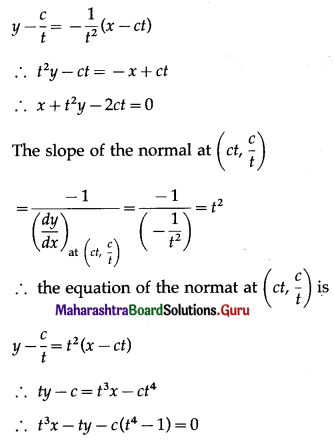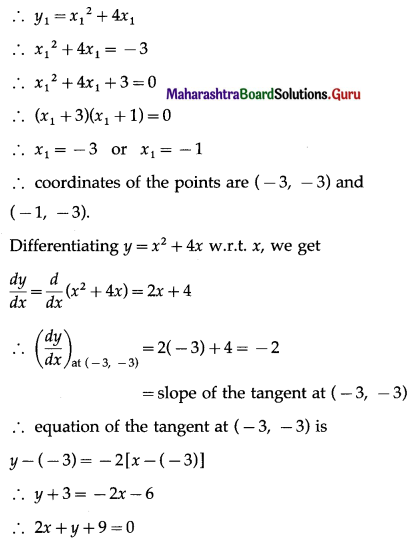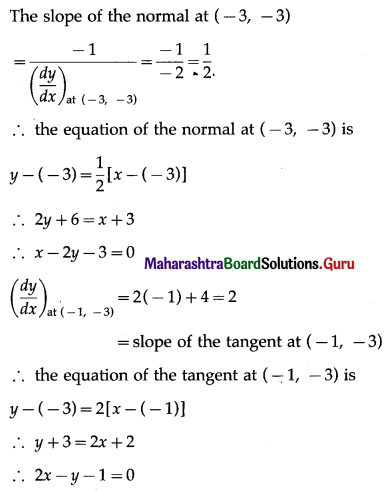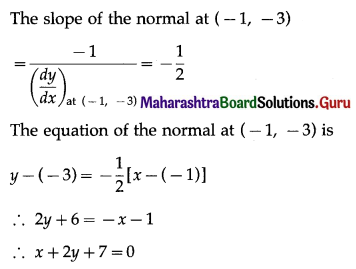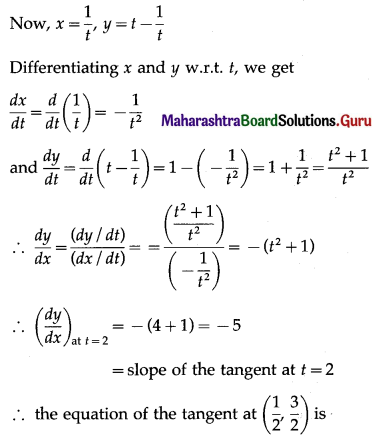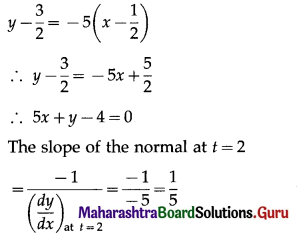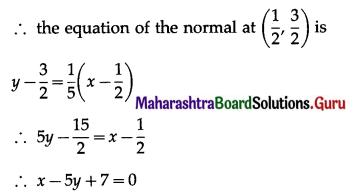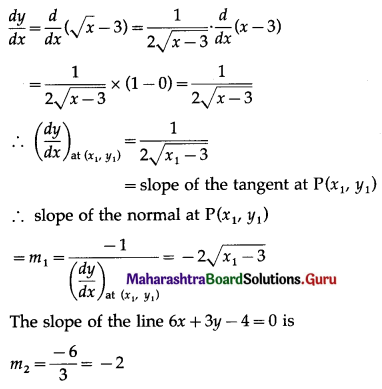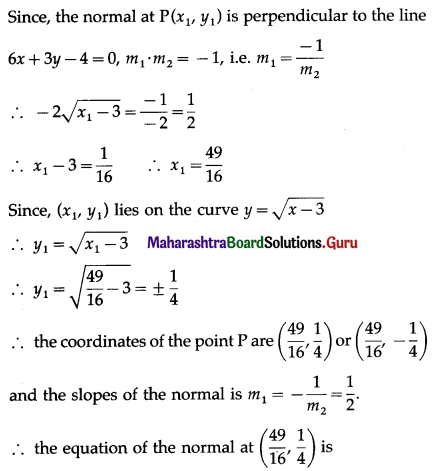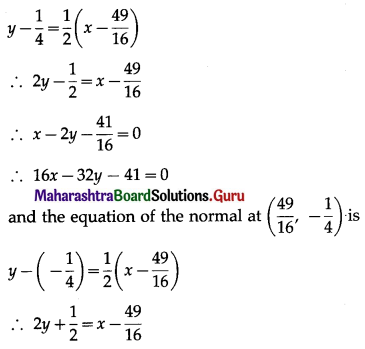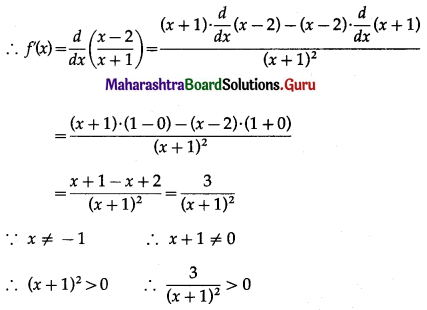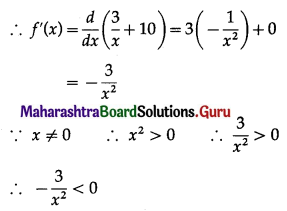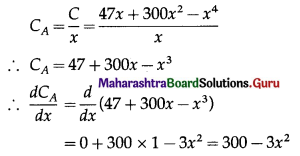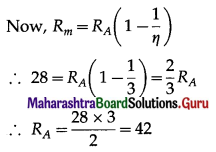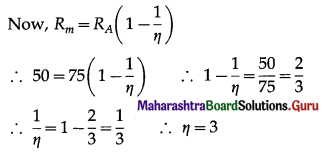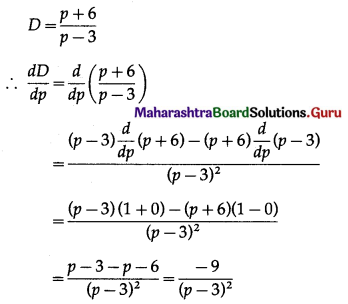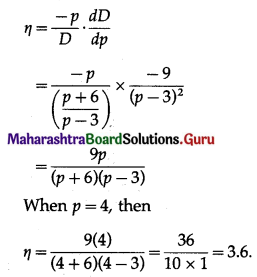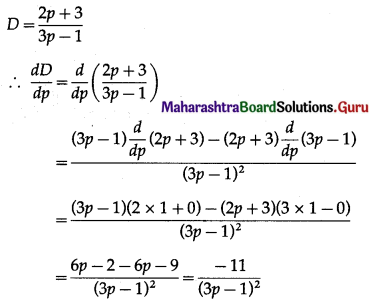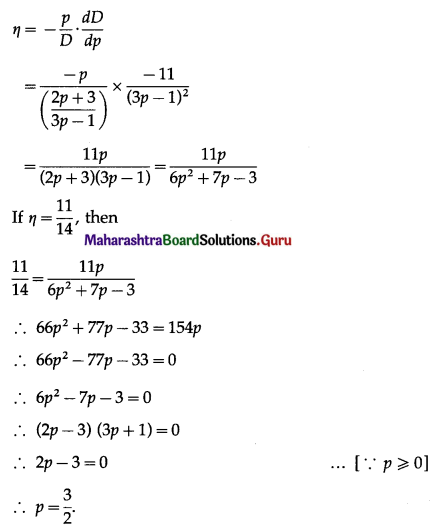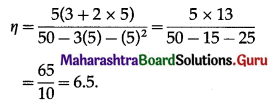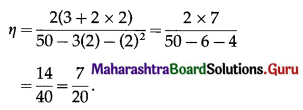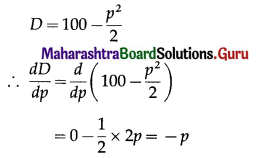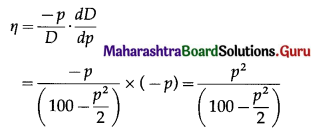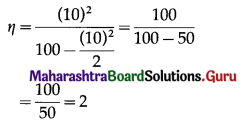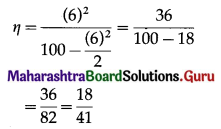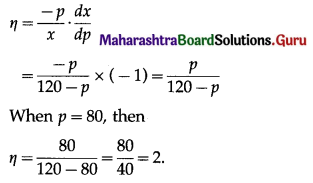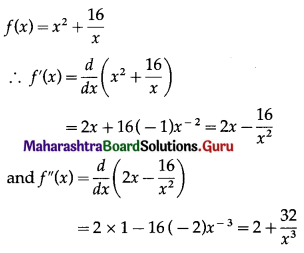Integration Class 12 Commerce Maths 1 Chapter 5 Exercise 5.6 Answers Maharashtra Board
Balbharati Maharashtra State Board Std 12 Commerce Statistics Part 1 Digest Pdf Chapter 5 Integration Ex 5.6 Questions and Answers.
Std 12 Maths 1 Exercise 5.6 Solutions Commerce Maths
Evaluate:
Question 1.
\(\int \frac{2 x+1}{(x+1)(x-2)} d x\)
Solution:
Let I = \(\int \frac{2 x+1}{(x+1)(x-2)} d x\)
Let \(\frac{2 x+1}{(x+1)(x-2)}=\frac{A}{x+1}+\frac{B}{x-2}\)
∴ 2x + 1 = A(x – 2) + B(x + 1)
Put x + 1 = 0, i.e. x = -1, we get
2(-1) + 1 = A(-3) + B(0)
∴ A = \(\frac{1}{3}\)
Put x – 2 = 0, i.e. x = 2, we get
2(2) + 1 = A(0) + B(3)
∴ B = \(\frac{5}{3}\)
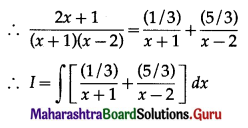
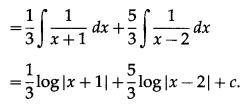
Question 2.
\(\int \frac{2 x+1}{x(x-1)(x-4)} d x\)
Solution:
Let I = \(\int \frac{2 x+1}{x(x-1)(x-4)} d x\)
Let \(\int \frac{2 x+1}{x(x-1)(x-4)}=\frac{A}{x}+\frac{B}{x-1}+\frac{C}{x-4}\)
∴ 2x + 1 = A(x – 1)(x – 4) + Bx(x – 4) + Cx(x – 1)
Put x = 0, we get
2(0) + 1 = A(-1)(-4) + B(0)(-4) + C(0)(-1)
∴ 1 = 4A
∴ A = \(\frac{1}{4}\)
Put x – 1 = 0, i.e. x = 1, we get
2(1) + 1 = A(0)(-3) + B(1)(-3) + C(1)(0)
∴ 3 = -3B
∴ B = -1
Put x – 4 = 0, i.e x = 4, we get
2(4) + 1 = A(3)(0) + B(4)(0) + C(4)(3)
∴ 9 = 12C
∴ C = \(\frac{3}{4}\)
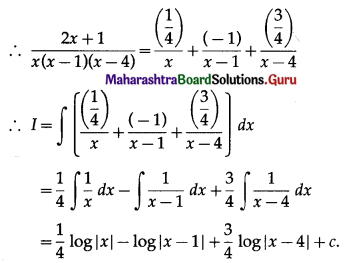
![]()
Question 3.
\(\int \frac{x^{2}+x-1}{x^{2}+x-6} d x\)
Solution:
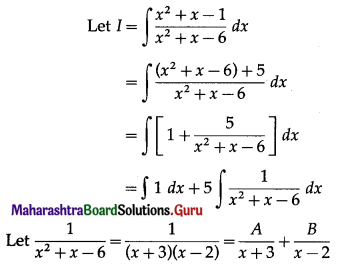
∴ 1 = A(x – 2) + B(x + 3)
Put x + 3 = 0, i.e. x = -3, we get
1 = A(-5) + B (0)
∴ A = \(\frac{-1}{5}\)
Put x – 2 = 0, i.e. x = 2, we get
1 = A(0) + B(5)
∴ B = \(\frac{1}{5}\)
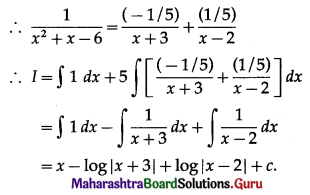
Question 4.
\(\int \frac{x}{(x-1)^{2}(x+2)} d x\)
Solution:
Let I = \(\int \frac{x}{(x-1)^{2}(x+2)} d x\)
Let \(\frac{x}{(x-1)^{2}(x+2)}=\frac{A}{x-1}+\frac{B}{(x-1)^{2}}+\frac{C}{x+2}\)
∴ x = A(x – 1)(x + 2) + B(x + 2) + C(x – 1)2
Put x – 1 = 0, i.e. x = 1, we get
1 = A(0)(3) + B(3) + C(0)
∴ B = \(\frac{1}{3}\)
Put x + 2 = 0, i.e. x = -2, we get
-2 = A (-3)(0) + B(0) + C(9)
∴ C = \(-\frac{2}{9}\)
Put x = -1, we get,
-1 = A(-2)(1) + B(1) + C(4)
But B = \(\frac{1}{3}\) and C = \(-\frac{2}{9}\)
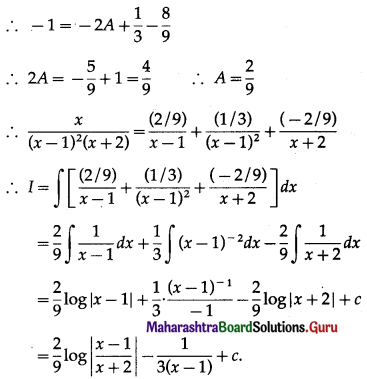
![]()
Question 5.
\(\int \frac{3 x-2}{(x+1)^{2}(x+3)} d x\)
Solution:
Let I = \(\int \frac{3 x-2}{(x+1)^{2}(x+3)} d x\)
Let \(\frac{3 x-2}{(x+1)^{2}(x+3)}=\frac{A}{x+1}+\frac{B}{(x+1)^{2}}+\frac{C}{x+3}\)
∴ 3x – 2 = A(x + 1)(x + 3) + B(x + 3) + C(x + 1)2
Put x + 1 = 0, i.e. x = -1, we get
3(-1) – 2 = A(0)(2) + B(2) + C(0)
∴ -5 = 2B
∴ B = \(-\frac{5}{2}\)
Put x + 3 = 0, i.e. x = -3, we get
3(-3) – 2 = A(-2)(0) + B(0) + C(4)
∴ -11 = 4C
∴ C = \(-\frac{11}{4}\)
Put x = 0, we get
3(0) – 2 = A(1)(3) + B(3) + C(1)
∴ -2 = 3A + 3B + C
But B = \(-\frac{5}{2}\) and C = \(-\frac{11}{4}\)
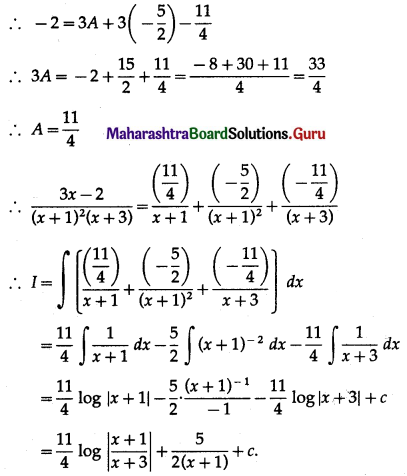
Question 6.
\(\int \frac{1}{x\left(x^{5}+1\right)} d x\)
Solution:
Let I = \(\int \frac{1}{x\left(x^{5}+1\right)} d x\)
= \(\int \frac{x^{4}}{x^{5}\left(x^{5}+1\right)} d x\)
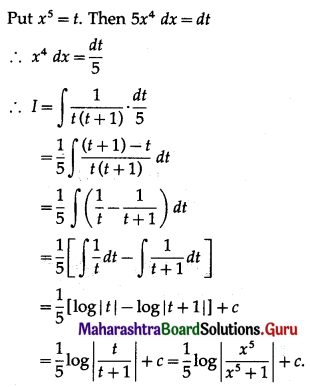
Question 7.
\(\int \frac{1}{x\left(x^{n}+1\right)} d x\)
Solution:
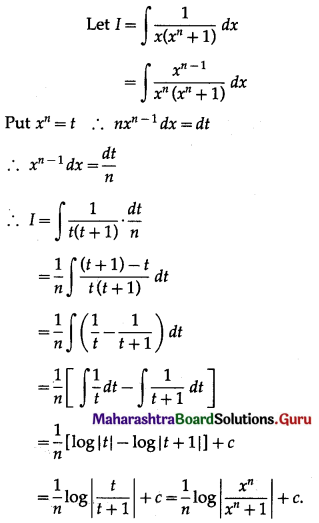
![]()
Question 8.
\(\int \frac{5 x^{2}+20 x+6}{x^{3}+2 x^{2}+x} d x\)
Solution:
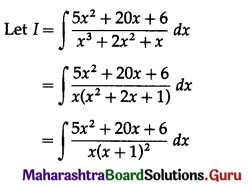
Let \(\frac{5 x^{2}+20 x+6}{x(x+1)^{2}}=\frac{A}{x}+\frac{B}{x+1}+\frac{C}{(x+1)^{2}}\)
∴ 5x2 + 20x + 6 = A(x + 1)2 + Bx(x + 1) + Cx
Put x = 0, we get
0 + 0 + 6 = A(1) + B(0)(1) + C(0)
∴ A = 6
Put x + 1 = 0, i.e. x = -1, we get
5(1) + 20(-1) + 6 = A(0) + B(-1)(0) + C(-1)
∴ -9 = -C
∴ C = 9
Put x = 1, we get
5(1) + 20(1) + 6 = A(4) + B(1)(2) + C(1)
But A = 6 and C = 9
∴ 31 = 24 + 2B + 9
∴ B = -1
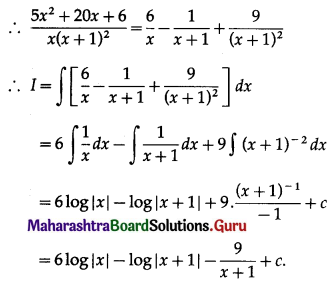
12th Commerce Maths Digest Pdf
- 12th Commerce Maths Exercise 5.1 Solutions
- 12th Commerce Maths Exercise 5.2 Solutions
- 12th Commerce Maths Exercise 5.3 Solutions
- 12th Commerce Maths Exercise 5.4 Solutions
- 12th Commerce Maths Exercise 5.5 Solutions
- 12th Commerce Maths Exercise 5.6 Solutions
- 12th Commerce Maths Miscellaneous Exercise 5 Solutions
